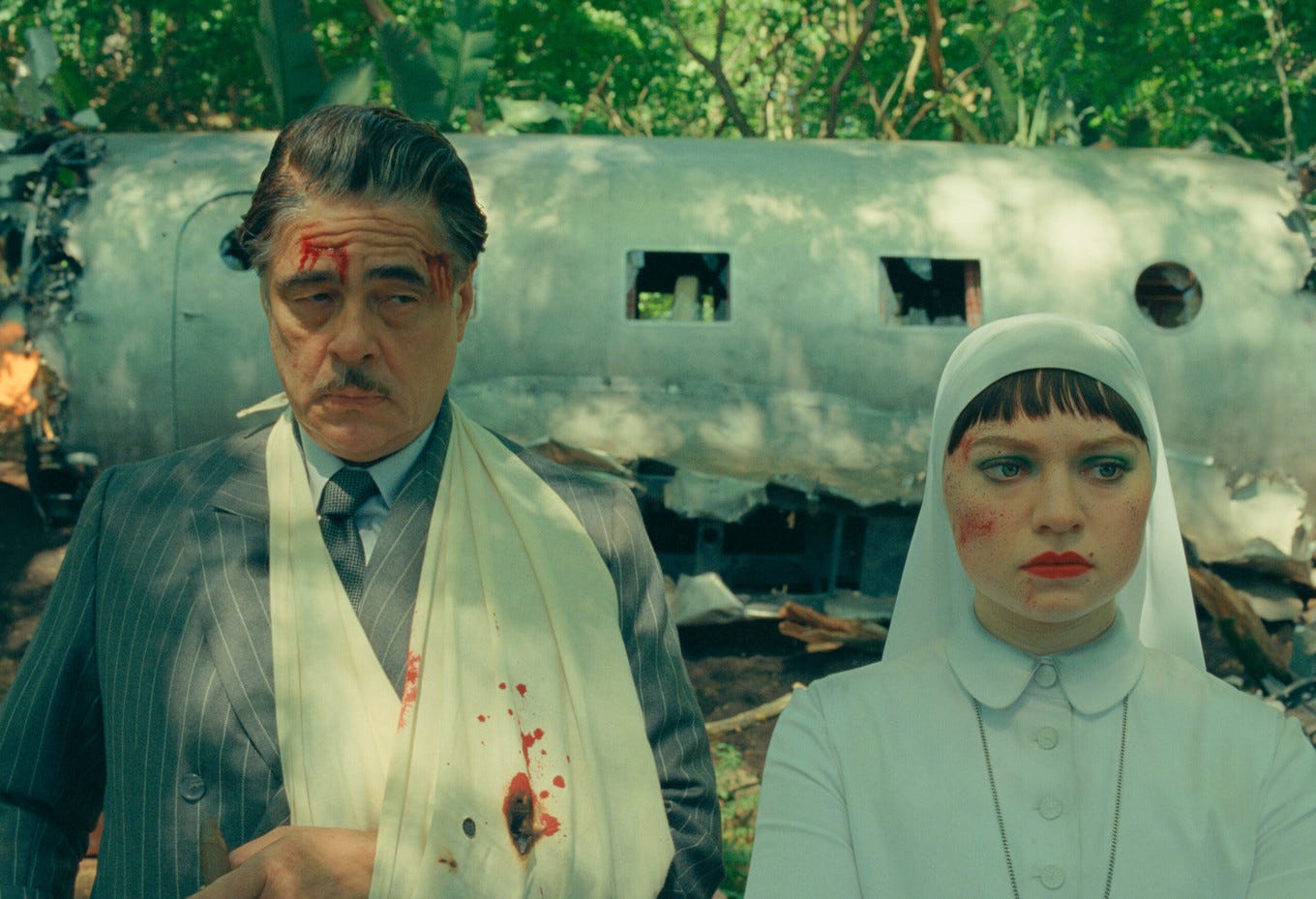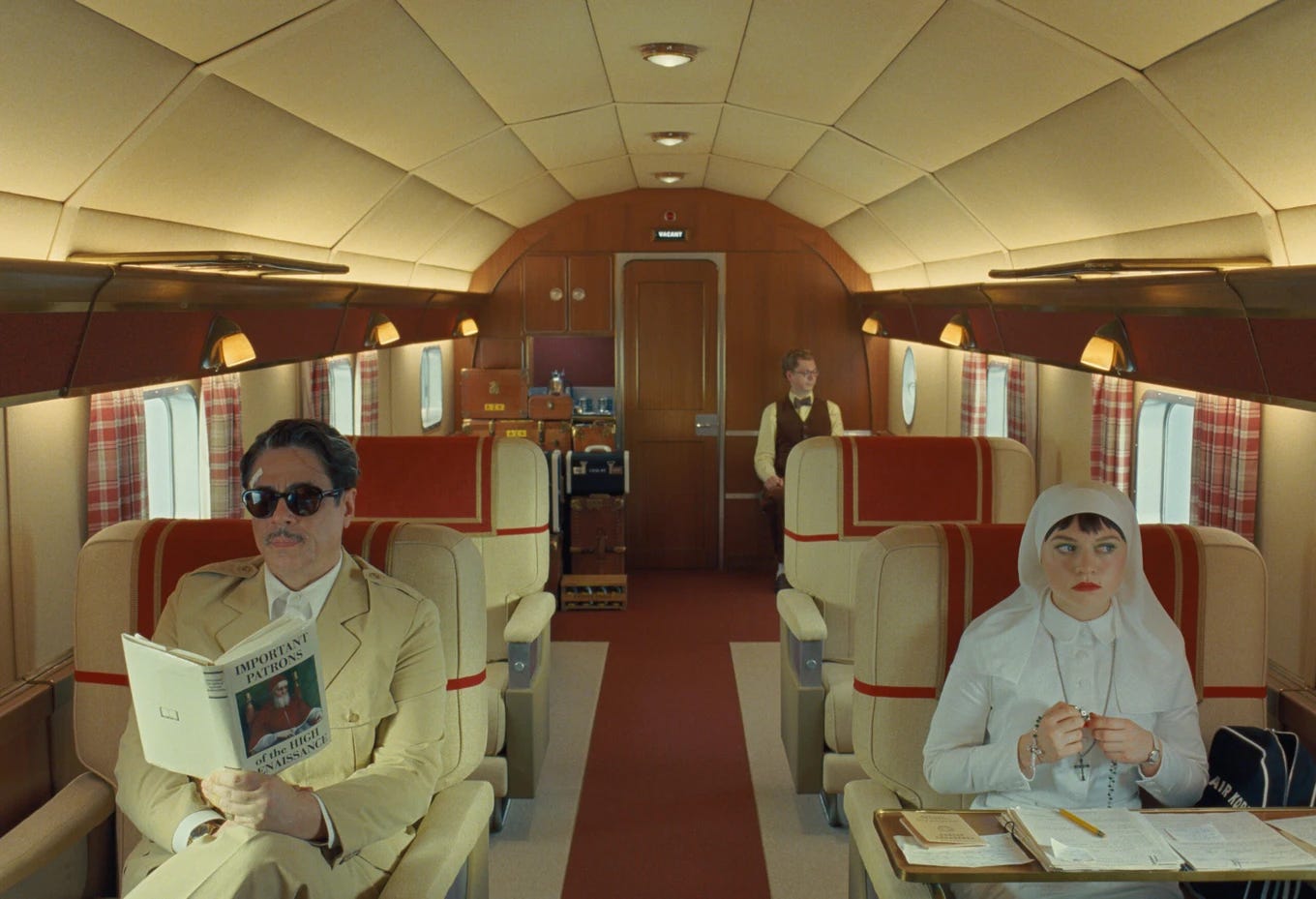Good Works in “The Phoenician Scheme”
Wes Anderson’s new film is also perhaps his most Christian.
Spoilers below for THE PHOENICIAN SCHEME
I’ve always had a love for Wes Anderson films. While his trademark style has all but become a meme by now, he continues to use that style to tell compellingly human stories. In a way, the over-stylized artifice of his visuals and dialogue allows for more direct and honest communication with the viewer. While his films can be interpreted in a variety of ways, he invites that interpretation because of his style, not in spite of it. And to my surprise, his latest film uses that uniquely distinct perspective to tell a story about the importance of—and relationship between—faith and works.
The Phoenician Scheme follows Liesl, a soon-to-be nun, as she is appointed heir to the estate of her father, Zsa-zsa Korda, a wealthy and corrupt businessman. Liesl and Korda embark on a mission to secure needed funds (he calls “The Gap”) in order to complete a series of major infrastructure projects. but they soon become the target of scheming tycoons, foreign terrorists, and determined assassins.
The ensuing hijinks are as hilarious as they are unexpected, from a high-stakes game of H-O-R-S-E basketball to a run-in with a quite polite group of robbers to a wedding proposal between second cousins.
With a delightful supporting cast (Michael Cera, Jeffrey Wright, and Benedict Cumberbatch are particularly great), surprising physical comedy, and absurdist humor in the dialogue, there’s a lot to love here. And of course, Wes Anderson brings his visual flair to it all, from direct framing and hard cuts to immaculate set design and quirky music from Alexandre Desplat.
But woven throughout the film’s strange events and the director’s signature style is a story of a lonely, faithless father and his estranged Christian daughter.
“God is absent here; why?” Liesl asks of her father, appalled at his extravagant home and his cruel business dealings. Korda (played by Benicio del Toro in a remarkably layered performance), handwaves the question away. Perhaps it was his abusive and abandoned upbringing, perhaps it was in his nature, but he doesn’t care. He’s perfectly fine with living this life.
Liesl agrees to be Korda’s heir “on a trial basis,” traveling with him in the hopes of doing good and perhaps even influencing him to be better. But Korda’s careless nature and shrewd schemes make that task seem impossible...until it isn’t.
The gospel message is never directly shared in The Phoenician Scheme. God briefly makes an appearance and mentions His son Jesus’ death. Liesl speaks a few times on forgiveness. But rather than evangelizing to Korda or the variety of strange figures she encounters in the film, she relies on her character and her actions to be her Christian witness.
“Let your light shine before others, so that they may see your good works and give glory to your Father who is in heaven.” – Matthew 5:16
And remarkably, her father takes notice. After an apparent miracle, Korda asks what words she prays to receive God’s intervention. “It’s not the words you say,” Liesl responds, “it’s your level of devotion.” As they spend more time together, Korda listens to her more, he lies a little less, and he slowly starts to see the world anew.
The film is also filled with a series of comedic assassination attempts on Korda, each one followed by a near-death vision of the heavens. In one vision he’s on trial for his works. In another vision he’s face-to-face with God (Bill Murray) pleading his righteousness. It’s a fascinating glimpse into the character’s psyche that is a bit unusual for Wes Anderson, but still manages to fit perfectly within his visual and thematic language. This break from form allows us each time to see Korda’s confusion and horror at the prospect of what will happen after his death.
Anderson masterfully weaves these supernatural visions of the afterlife, Korda’s bizarre earthly experiences, and his intimate conversations with Liesl into a conclusion that feels both earned and surprising: Korda’s conversion. Both Liesl and the audience are initially skeptical of this decision. Is this just another one of Korda’s scheme in the hopes of getting something he wants?
Just as James argues, “faith by itself, if it does not have works, is dead” (James 2:17), it’s only when Korda backs up his faith through works that we see this decision was made in earnest. He realizes that he can’t ask anyone else to pay the enormous remaining sum of his project. No one else can fill The Gap of his projects, literally. He has to pay the price himself in order for the project to be achieved, a choice in and of itself that has echoes of Christ’s sacrifice. And in order to do so, he radically changes his life, giving up all his riches and extravagant lifestyle.
Jesus answered, “If you want to be perfect, go, sell your possessions and give to the poor, and you will have treasure in heaven. Then come, follow me.” – Matthew 19:21
The finale sees Korda battling his brother, himself a corrupt businessman that acts as a dark mirror of the man Korda used to be. It’s a showdown between good and evil, life and death, light and darkness (even down to their wardrobe, Korda in light robes and his brother in all black). After countless assassination attempts, death has seemingly come for Korda one last time; but this time, Korda has something to live for.
In the film’s epilogue, we see a changed man. A caring father. A dedicated and humble servant. An honest businessman. Liesl, having left the convent but staying firm in her faith, ends the film by writing to her Mother Superior, saying she believes she and Korda are doing “good works” with their new life.
Works really are the film's focus: the good, the bad, and how those works reflect our hearts. And though it’s a common pitfall for Christians and non-Christians alike to mistake salvation as something achievable through works, The Phoenician Scheme is careful to show that works are the result of salvation, not the cause. It’s a beautiful message in a beautifully unexpected turn from Wes Anderson. I highly recommend it.
“For we are his workmanship, created in Christ Jesus for good works, which God prepared beforehand, that we should walk in them.” – Ephesians 2:10








Thanks, Christian. I thought this film was special when I saw it 2 nights ago, but walking through it here with you makes it more special and makes me want to revisit it.